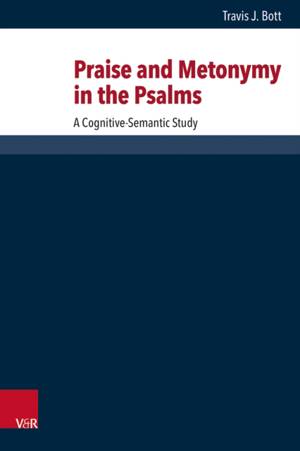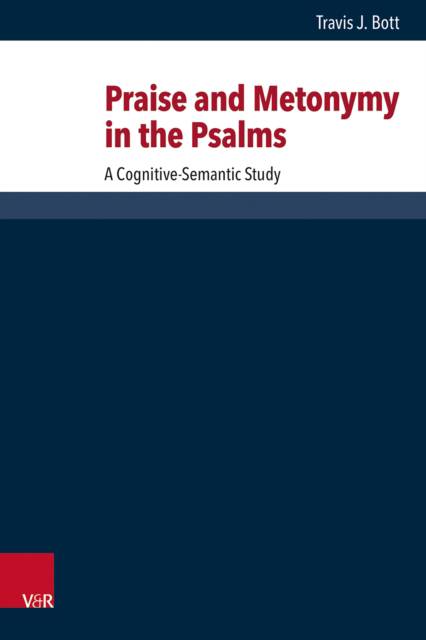
Bedankt voor het vertrouwen het afgelopen jaar! Om jou te bedanken bieden we GRATIS verzending (in België) aan op alles gedurende de hele maand januari.
- Afhalen na 1 uur in een winkel met voorraad
- In januari gratis thuislevering in België
- Ruim aanbod met 7 miljoen producten
Bedankt voor het vertrouwen het afgelopen jaar! Om jou te bedanken bieden we GRATIS verzending (in België) aan op alles gedurende de hele maand januari.
- Afhalen na 1 uur in een winkel met voorraad
- In januari gratis thuislevering in België
- Ruim aanbod met 7 miljoen producten
Zoeken
Praise and Metonymy in the Psalms
A Cognitive-Semantic Study
Travis J Bott
Hardcover | Engels | Forschungen zur Religion und Literatur des Alten und Neuen Testaments | nr. 278
€ 78,45
+ 156 punten
Omschrijving
In this study, Travis Bott makes a fresh contribution to the understanding of Hebrew praise language in the Psalms. In addition, he devotes sustained attention to the neglected topic of metonymy in the Hebrew Bible. The theoretical framework for investigating both of these topics and exploring their interaction is cognitive semantics, a major branch of the cognitive movement in contemporary linguistics. Bott defines metonymy as a cognitive process in which one entity (the vehicle) provides mental access to another perceptually contiguous entity (the target). He also draws on recent theoretical developments, such as conceptual metaphor and metonymy, metonymy as a prototypical category, metonymy in lexical polysemy, and the interaction of metaphor and metonymy in expressions (metaphtonymy). A cognitive-semantic approach to the Psalms reveals that metonymy profoundly shapes the concepts and language of Hebrew praise. Bott considers metonymy at both the lexical and contextual levels. At the lexical level, he finds that the two most important nouns for praise in the Psalms, tehillah and todah, exhibit polysemy that is governed by conceptual metonymies. In addition, at the contextual level, he treats the objects and subjects of the four most common verbs for praise in the Psalms (hll, ydh, zmr, brk). He finds that conceptual metonymies drive figurative characterizations of YHWH, the preeminent object of praise, as well as the many praising subjects of Israel. Bott demonstrates that metonymy is both more common and more varied than scholars of the Hebrew Bible have previously supposed.
Specificaties
Betrokkenen
- Auteur(s):
- Uitgeverij:
Inhoud
- Aantal bladzijden:
- 216
- Taal:
- Engels
- Reeks:
- Reeksnummer:
- nr. 278
Eigenschappen
- Productcode (EAN):
- 9783525360941
- Verschijningsdatum:
- 10/03/2025
- Uitvoering:
- Hardcover
- Formaat:
- Genaaid
- Afmetingen:
- 155 mm x 231 mm
- Gewicht:
- 203 g

Alleen bij Standaard Boekhandel
+ 156 punten op je klantenkaart van Standaard Boekhandel
Beoordelingen
We publiceren alleen reviews die voldoen aan de voorwaarden voor reviews. Bekijk onze voorwaarden voor reviews.









